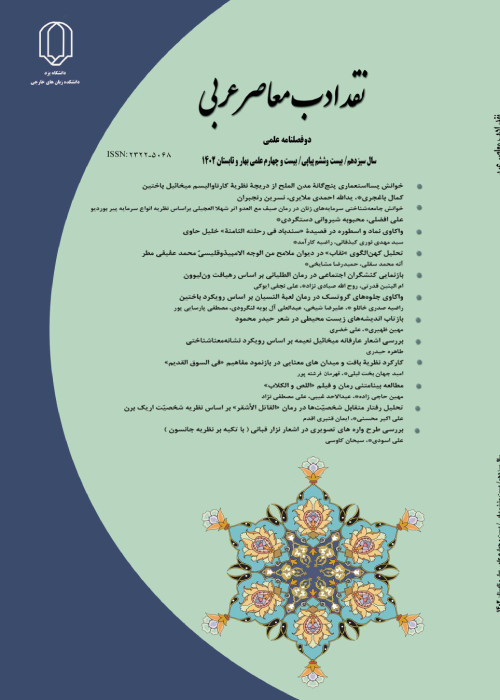The Reflection of the Jaheli Saa`lik poems in Ali Fode`s poetry: An analysis based on Freud’s purposeful association mechanism
Author(s):
Article Type:
Research/Original Article (دارای رتبه معتبر)
Abstract:
Introduction
Recognizing the nature of human being with the aim of discovering the fundamental motives of human behavior and in the pursuit of human nature has been center of attention of researchers in various scientific fields such as psychology. Freud said that the main factor of effort and human activity in all spheres of life is the sensation of his failure, which is found in almost all human beings. He cites methods to compensate for the failure, one of which is" Association". Some contemporary Arab poets have expressed their aims and the problems of the society by hiding behind their masks. For this reason, in the contemporary era, the tendency to reflect on the Sa'alik works has become a common practice for the critics of the society. So, we can say that the agents of Saa`lik and the way they live is an effective behavioral approach throughout the history. The principles of Saa`lik`s life has made suitable patterns for contemporary poets. Ali Fode grew up in an environment full of anxiety and violence in his childhood. The emotional problems caused by the sudden death of his parents and the ignoring of the politicians on the Palestinian issue caused him to turn against the world like an ignorant Saa`lik and consider it as a model to achieve their goals. Methodology
This study is based on the qualitative analysis of the content of Ali Fode`s poems and the use of psychological criticism in the literature and the library resources. The purpose is to investigate why and how Ali Fode (1946-1982), the contemporary Palestinian poet, associate himself with the Saa`lik Jaheli. Results and Discussion
Regarding "empathy as a natural phenomenon" in his poetry, Ali Fode avoided people because he had seen the cruelty of the society and the incompetence of the Arab leaders against the ruling regime of Palestine. He was in a hard time and saw no one accompanying him on the path of defending his homeland and realizing the ideal of democratic aspirations. Concerning association with Saa`lik, "enduring hardships to achieve the goal", it should be said that Ali Fode also had revolutionary and anti-oppression spirits; he could never tolerate the invasion of Palestine by the enemies and the indifference of Arab leaders to the occupation of this land. This caused the poet to consider the ignorant Saa`lik as his role model and to endure hardships like them and invite people to do the same. Regarding Ali Fode`s association with Sa`alik in the phenomenon of "love for the desert", the concept of the desert in his poetry differs from that desert which was raised in the Sa'alik poem. The emptiness of the desert in the Sa'alik poem means the absence of human beings in that place, but, by desert, Ali Fode means that the hearts of the Arab officials are empty of compassion and sympathy with the Palestinians. Moreover, the word “desert” can be used as the land of Palestine which has become empty of self-conscious and heroic human beings. In the case of association in the attribute of " turning away from the relatives and friends", it must be said that from Ali Fode`s point of view, one of the factors in the success of Sa`alik in achieving their goals was their switching away from the tribe that did not help them. For this reason, he avoided the people who had forgotten their goals and achieved their goals in isolation, as he did in order to achieve his goal of saving the Palestinian people. The last characteristic is " self-esteem " for which Ali Fode was tired of oppression and injustice against Palestinian people. So, he considered self-esteem as one of the factors in achieving his goals. To achieve his own purposes, he imitated Sa`alik. In general, Ali Fode`s poems are good evidence to prove his purposeful association with Sa'alik. From this contemporary poet`s perspective, in fact, the characteristics of Sa`alik were the key to success. To achieve his goals in the Palestinian environment, he identified himself with those characteristics. Conclusion
The results of the study show that Fode's emotional break in the family and the lack of support from his friends and Palestinian authorities to achieve his social aims caused him to unconsciously follow the Saa`lik Jeheli`s method. He did this in his imaginations by turning away from the society, associating with natural phenomena and identifying himself with the revolutionary poets of the Jaheli period. The main concepts of Fode's poems as a result of this association are empathy with natural phenomena, the tolerance of difficulties, rebellion against the enemies, love for the desert, turning away from the relatives and friends, self-steem and self-respect.Keywords:
Language:
Persian
Published:
نشریه نقد ادب معاصر عربی, Volume:11 Issue: 20, 2021
Pages:
93 to 119
https://magiran.com/p2342526
دانلود و مطالعه متن این مقاله با یکی از روشهای زیر امکان پذیر است:
اشتراک شخصی
با عضویت و پرداخت آنلاین حق اشتراک یکساله به مبلغ 1,390,000ريال میتوانید 70 عنوان مطلب دانلود کنید!
اشتراک سازمانی
به کتابخانه دانشگاه یا محل کار خود پیشنهاد کنید تا اشتراک سازمانی این پایگاه را برای دسترسی نامحدود همه کاربران به متن مطالب تهیه نمایند!
توجه!
- حق عضویت دریافتی صرف حمایت از نشریات عضو و نگهداری، تکمیل و توسعه مگیران میشود.
- پرداخت حق اشتراک و دانلود مقالات اجازه بازنشر آن در سایر رسانههای چاپی و دیجیتال را به کاربر نمیدهد.
In order to view content subscription is required
Personal subscription
Subscribe magiran.com for 70 € euros via PayPal and download 70 articles during a year.
Organization subscription
Please contact us to subscribe your university or library for unlimited access!


